Immigration

Last week, the world was introduced to John Allen Chau, the U.S. American “adventurer” and missionary who was killed by an indigenous group on North Sentinel Island. According to a statement from missionary organization All Nations, Chau was a “seasoned traveler who was well-versed in cross-cultural issues” and had “previously taken part in missions projects in Iraq, Kurdistan and South Africa.” Now, Indian police have begun the dangerous mission of trying to recover the body even though a tribal rights group has urged officials to call off the search, claiming it puts them and the indigenous group in danger.
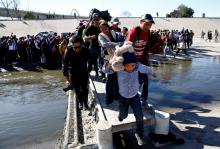
When children scream from tear gas where they’ve been told to wait,
when signs tell families, “Don’t pass!” outside our nation’s gate—
O Lord who welcomed children and loves each little one,
we cry, “Where is compassion?” We pray, “What have we done?”

The first cast in the ochre light of the dawning sun is a morning prayer, filled with hope and faith that ceremonies sought in earnest will feed the soul. I reel dutifully, waiting for a faint tap on the end of my line. My father stands at the front of the boat, scanning for ripples on the water in the low light. “Wachale!” he exclaims in joking Spanglish as he reels in the first largemouth of the day. Two Mexican-Americans bass fishing in Texas. This is the face of the Reconquista.

THE YEAR 2019 marks 400 years since a boat carrying “20 and odd” enslaved Africans landed at Point Comfort in colonial Virginia. To commemorate this and other historic 1619 events, Virginia will host “American Evolution,” a yearlong celebration in which these events have been transmuted into national values. The arrival of enslaved Africans on American shores has become “diversity.”
Yet, last summer a West African immigrant was deported back to Africa to face slavery, in a transatlantic reversal of journeys that underscores the persistence of immorality in this involuntary passage.
On Aug. 22, Seyni Diagne, a 64-year-old immigrant battling kidney cancer and hepatitis B, was deported from Dulles International Airport in Virginia to his home country of Mauritania after 17 years in the U.S. There he faces enslavement through forced labor. Mauritania has one of the highest rates of slavery in the world, impacting more than 40,000 black Mauritanians.
The day following Diagne’s deportation was the International Day for the Remembrance of the Slave Trade and its Abolition. The Commonwealth of Virginia chose to mark it by recognizing the first Africans in English North America.

When I landed at the airport in Brownsville, Texas, the Border Patrol was visibly present. I was suddenly reminded of my ancestors who were also greeted by “border patrol” while fleeing from the brutal chattel slavery in the southern states and making their way north – even all the way to Canada.
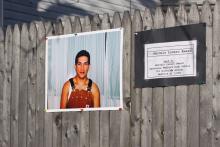
On Nov. 8, 2008, Marcelo Lucero, an undocumented immigrant from Ecuador working at a dry cleaning store, was attacked by seven teenagers from the local high school in Patchogue, Long Island, and stabbed to death. His attack, according to testimony, was part of a weekend “sport” in which these teenagers routinely targeted and attacked brown-skinned people.

Lately, I have been asking myself the following question: How can sincere Christians embrace white nationalism? My question stems less from surprise and more from a desire to understand the mechanics. In church circles and in seminary, I heard about Barth, Bonhoeffer, and those who resisted. But I rarely heard about the majority of white Christians who supported a demagogue whose rhetoric had violent consequences.
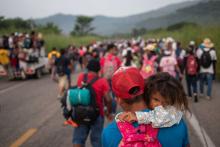
Requesting asylum by presenting at a point of entry is the legal way to seek protection; it's not an assault on this country. To "other" brown-bodied people is destructive, especially if they’re in vulnerable situations, because it creates categories that automatically view some as superior. This has been the basis for many of the world’s greatest tragedies. Fear is the basis of all of these accusations.

In March, the Trump administration added a question about citizenship to the 2020 Census. Multiple lawsuits have been brought against this addition. The last time some form of citizenship question was asked on the census was 1950. If this question wasn’t asked for six consecutive censuses, then why is the Trump administration pushing to reinstate it now?
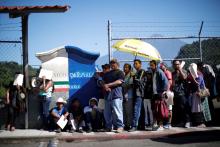
A group of over a thousand Central Americans in Guatemala headed toward the Mexican border on Tuesday, as a larger caravan of migrants that has angered U.S. President Donald Trump paused in southern Mexico on its planned journey toward the U.S. border.
Trump has vowed to begin cutting millions of dollars in aid to Central America and called the caravan in Mexico a national emergency as he seeks to boost his Republican Party's chances in the Nov. 6 congressional elections.
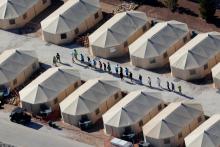
These attacks on people’s innate dignity and sacred worth assault our most cherished moral and religious values. We read in Genesis that all people are made in the image of God. In Paul’s letters, he proclaims that in God earthly divisions fall away, that all people form part of God’s body. Jesus himself promises: Whatever you do to the least of these, you do to me. Attempts to excuse human rights abuses committed against some people are thus not just unconstitutional — they assault God by denigrating and desecrating that divine, indwelling spark.

And nearly every Sunday, as broken bread stands for broken bodies, I am struck with the words of James Baldwin, when he wrote that to be born black or a person of color in America means that you must “give up all hope of communion.”
When Baldwin wrote those words he believed that the nation was both a Christian nation and a white nation. White supremacy was the foundation of American rites and rights. Whiteness was a prerequisite to be encircled by compassion and included in citizenship. The denial of communion — the denial of the body of Christ and the rejection from the body politic — was connected to the nation’s original sin.

EQUAL PARTS brilliant imagery and candid reflection, All the Colors We Will See is a story on becoming. With vivid attention to detail and a deep reservoir of wisdom, Patrice Gopo has carefully crafted a collection of essays on love, loss, and longing.
This story begins in the 1980s, weaving together layers of identity formation as we learn Gopo’s background as the daughter of Jamaican immigrants and explore her adolescent upbringing in Anchorage, Alaska. Throughout this book Gopo intimately relays her difficulties as a constant minority—African American with some East Indian heritage—often lacking cultural peers in her evolving spaces. From witnessing the acquittal of O.J. Simpson at her predominantly white high school to finding black community at Carnegie Mellon University to meeting the love of her life in Cape Town, South Africa, we are taken on a journey of self-discovery and self-acceptance.
This book is not merely reflection. It is a deeper introduction to the complex intersection of race and immigration and how these can inform one’s developing sense of self. Time and time again, Patrice Gopo lives into an identity as an “other,” struggling to find her fit.
“‘I don’t really think of you as being black,’ a dear college friend once said to me,” Gopo writes. “I held the phone against my ear and paused a moment as mild indignation crept through my mind. ‘Of course I’m black,’ I replied.”

The proposed regulation from the Department of Homeland Security would expand immigration officers' ability to deny visas or legal permanent residency to aspiring immigrants if they have received a range of taxpayer-funded benefits to which they are legally entitled, such as Medicaid, the Medicare Part D low-income subsidy, Section 8 housing vouchers, and the Supplemental Nutrition Assistance Program, which is commonly known as food stamps.
Recently my mother told me that if the authorities had stopped her family at any point as they fled from Poland, she would have been separated from her parents. They would have survived the horrors of the Holocaust only to face the fresh hell of a Communist regime. That image immediately brought to mind the heart-rending photos from earlier this year of over 2,600 children, from infants to teenagers, being forcibly separated from their parents as they crossed the U.S.-Mexico border due to the Trump administration’s zero-tolerance policy on immigration.

This September marks the anniversary of Hurricane Maria, one of the most intense natural disasters to hit the Caribbean in over a decade. Recent studies estimate that of the 3,057 people killed by last year’s storms, 2,975 of those lives lost were Puerto Rican. These numbers continue to grow as the failing infrastructure on the island claims more casualties. The media has tried to unravel the causes of these deaths and scrutinize the failed deliveries of humanitarian aid that never reached residents. Corruption has been revealed at every level. Still, few have questioned the policies that enable it.

The Trump administration said on Thursday that it plans to withdraw from a federal court agreement that strictly limits the conditions under which authorities can detain migrant children, and proposed new rules that it said would enable it to detain minors during their immigration proceedings.
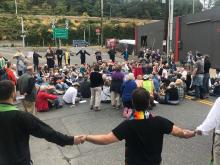
Knowing that so many more suffer from inhumane incarceration, I joined with more than 20 interfaith clergy from around Oregon and got arrested “for failure to comply” by sitting in a prayer circle in front of the main gates of our local ICE field office. We were gathered with hundreds of others, lifting up stories of those still detained and separated from families, singing songs of lament and joy, and praying that justice would prevail.

Although New York state has passed $15 minimum wage legislation, there are thousands of home health care workers, mostly immigrant women of color, who are paid only half of the hours they work.
Epifania Hinchez, who immigrated to the U.S. from the Dominican Republic in her 40s, worked as a home health care worker for 17 years in NYC. The heavy-lifting – her last patient weighed 290 pounds and could not walk – required in her job led to shoulder and wrist injuries, as well as nerve damage which has required surgery. For her entire career as a home health attendant, she has only been paid for 13 hours of her 24-hour shifts.

I am in a cramped waiting room overflowing with the family members of detained immigrants. There is no bathroom easily accessible nor any other amenity. Family members and other visitors, many of them children, wait for hours here at Stewart Immigration Detention Facility for the opportunity to spend the one hour they are permitted per week with their loved one. When a staff member finally ushers me back to meet with a detainee at this Georgia facility, I notice that his employee badge bears the slogan, “CoreCivic: Pride in All We Do!”